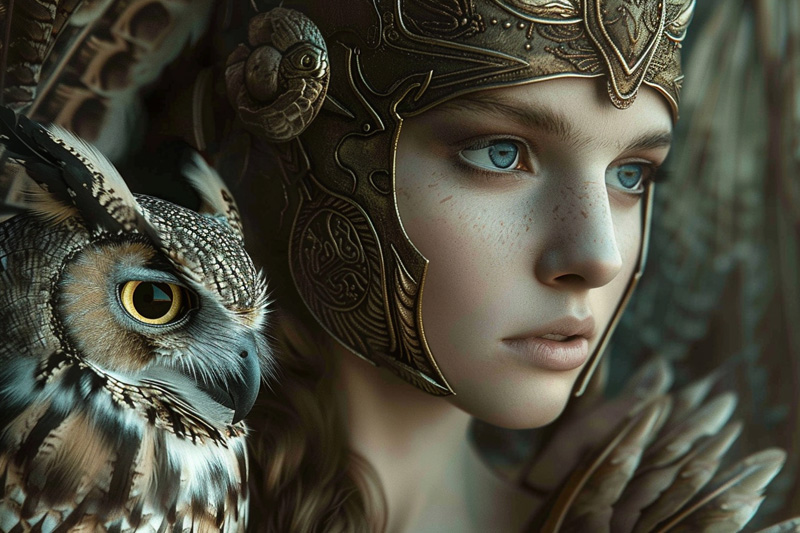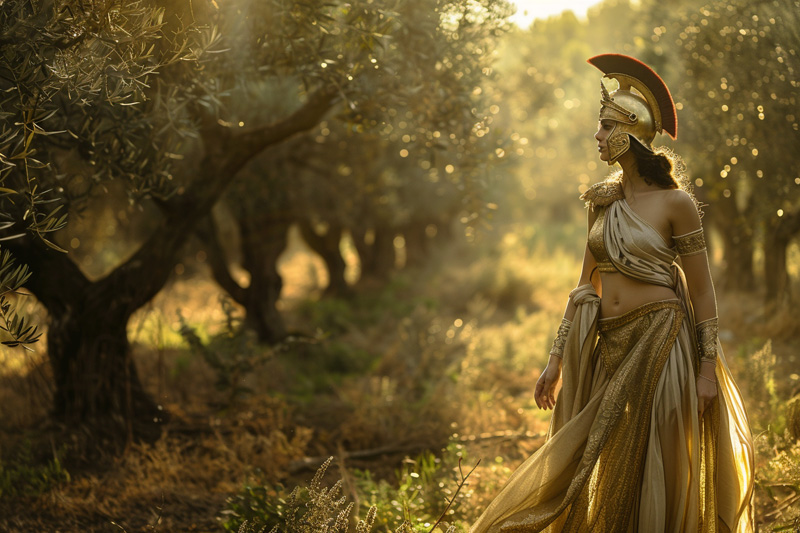KidZone Geography: Greek Mythology
About Athena, Goddess of Wisdom and Warfare
Introduction to Athena
Athena, one of the twelve Olympian deities in Greek mythology, is the goddess of wisdom, warfare, and crafts. Known for her strategic skill in battle and her role as a protector of cities, Athena is often depicted with a shield and spear, wearing a helmet and accompanied by an owl. She embodies wisdom, courage, and civilization, making her one of the most revered deities in Greek mythology.

Quick Facts About Athena
What is Athena the Greek goddess of?
Athena is the Greek goddess of wisdom, warfare, strategy, and crafts. She is also known as a protector of cities, particularly Athens, which is named after her.
What are Athena's sacred animals?
Athena's sacred animal is the owl, symbolizing wisdom and knowledge. The snake is also associated with her, representing renewal and protection.
What are Athena's symbols?
Athena's primary symbols are the owl, the olive tree, and the aegis (a protective cloak). The owl represents wisdom, the olive tree symbolizes peace and prosperity, and the aegis signifies her protective nature.

Origins and Birth
Birth from Zeus's Head
Athena's birth is one of the most unique in Greek mythology. She sprang fully grown and armored from the forehead of Zeus after he swallowed her pregnant mother, Metis. This miraculous birth signifies Athena's emergence as a powerful and wise deity, embodying both maternal and paternal qualities.
Athena's Role in Greek Mythology

Goddess of Wisdom and Warfare
Athena's primary roles are as the goddess of wisdom and warfare. Unlike Ares, who represents the chaotic and violent aspects of war, Athena embodies strategic warfare and justice. She is often invoked for guidance in both intellectual pursuits and battle strategies.
Patron of Crafts and Weaving
Athena is also the patron of crafts, particularly weaving. She is credited with teaching humans various skills and arts, including shipbuilding and metalwork. Her expertise in crafts highlights her role as a civilizing force.
Iconography and Symbols

The Owl
The owl is Athena's most recognizable symbol, representing her wisdom and keen insight. It is often depicted accompanying her in art and literature.
The Olive Tree
The olive tree symbolizes peace and prosperity, stemming from the myth of Athena's gift to the city of Athens. This tree became a symbol of the city's wealth and cultural achievements.

The Aegis
The aegis, a protective cloak often depicted as a shield, symbolizes Athena's role as a protector. It is usually adorned with the head of the Gorgon Medusa, adding to its formidable power.
Major Myths Involving Athena
The Contest with Poseidon
One of the most famous myths involving Athena is her contest with Poseidon for the patronage of Athens. Poseidon struck the ground with his trident, creating a saltwater spring, while Athena offered the olive tree. The citizens chose Athena's gift, making her the city's patron and naming it Athens in her honor.
The Tale of Athena's Gift to Athens
The Birth of Erichthonius
Athena played a role in the birth of Erichthonius, an early king of Athens. He was born from the earth after Hephaestus attempted to assault Athena, and she protected him and raised him as her own. This myth highlights her protective nature and connection to the city of Athens.
The Weaving Contest with Arachne
Athena's skill in weaving is showcased in the myth of Arachne. Arachne, a mortal weaver, challenged Athena to a weaving contest. Although Arachne's work was flawless, Athena punished her for her hubris by transforming her into a spider, condemning her to weave for eternity.
The Story of Arachne the Weaver
Athena's Relationships and Offspring

Virgin Goddess
Athena is known as a virgin goddess, committed to chastity and independence. She did not marry or have children, focusing instead on her role as a protector and guide.
Relationships with Heroes
Athena often aided heroes in their quests, providing them with wisdom and guidance. Notable heroes she assisted include Odysseus, Perseus, and Heracles. Her involvement in their stories underscores her role as a protector and strategist.
Worship and Cult of Athena

Temples and Sanctuaries
Athena was worshipped throughout ancient Greece, with many temples and sanctuaries dedicated to her. The most famous of these is the Parthenon in Athens, a grand temple that served as a center for her worship and a symbol of the city's devotion to her.
Festivals and Rituals
Several festivals celebrated Athena's influence over wisdom, warfare, and crafts. The most notable of these is the Panathenaia, held annually in Athens. This festival included athletic competitions, musical contests, and a grand procession to the Parthenon, where offerings were made to Athena.
Athena in Art and Literature

Classical Depictions
In classical art, Athena is often depicted as a stately, armored figure with a shield and spear. These representations emphasize her role as a warrior goddess and her protective nature.
Renaissance and Beyond
During the Renaissance, artists like Botticelli and Raphael drew inspiration from classical depictions of Athena, incorporating her into their works. Raphael's frescoes, for example, often depict Athena as a symbol of wisdom and justice.
Modern Interpretations
In modern times, Athena continues to be a prominent figure in literature, film, and popular culture. She appears in various forms, from comic books and movies to television series and video games. These contemporary portrayals often explore different aspects of her character, from her intellectual pursuits to her martial prowess. In the Percy Jackson series, for example, Athena is depicted as a wise and strategic goddess, reflecting modern interpretations of her myth.
Conclusion
Athena remains one of the most revered figures in Greek mythology. Her role as the goddess of wisdom, warfare, and crafts, combined with her complex personality and significant myths, make her a fascinating character. As the embodiment of intellect, strategy, and civilization, Athena's influence extends across the divine and mortal realms. Her enduring impact can be seen in the continued fascination with her myths and the artistic representations that keep her legend alive. Through her worship, iconography, and the rich tapestry of stories that surround her, Athena exemplifies the brilliance and complexity of ancient Greek religion and mythology.

